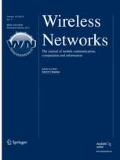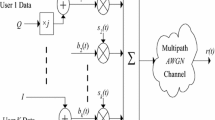Abstract
The asymptotically combined optimal transmission power and rate control policy is derived for a DS-CDMA time varying fading channel with multiple user classes, random spreading codes and a receiver using either a conventional matched filter (MF) or a minimum mean square error (MMSE) multiuser detector. For a general objective function, the optimal policies are given by closed form functions of a single Lagrangian multiplier. The optimal policies are demonstrated by an application, where the transmission power is adapted to the channel fade variations, and the transmission rates are adapted to the tier containing the mobile. The effect of the number of tiers on the optimal transmission rate are presented for MF and MMSE receivers in an environment with Lognormal and Rayleigh fading. It is shown that with an MMSE receiver, there is a substantial increase in the total transmission rate, whereas only a negligible increase exists with a MF receiver.
Similar content being viewed by others
References
J. M. Aein, Power balancing in systems employing frequency reuse, Comsat Tech. Rev. 3(2) (1973) 277–300.
M. Andersin, Z. Rosberg and J. Zander, distributed discrete power control in cellular PCS, Wireless Personal Communications 7 (1998) 1–21.
D. P. Bertsekas, Nonlinear Programming: 2nd edn. Athena Scientific, Belmont, MA, USA, 1999.
G. J. Foschini and Z. Miljanic, A simple distributed autonomous power control algorithm and its convergence, IEEE Trans. on Veh. Tech. 42(4) (1993) 641–646.
A. J. Goldsmith and P. P. Varaiya, Capacity of fading channels with channel side information, IEEE Trans. Inform. Theory 43 (Nov. 1997) 1986–1992.
S. A. Jafar and A. Goldsmith, Adaptive multirate CDMA for uplink throughput maximization, IEEE Transactions on Wireless Communications 2(2) (March 2003) 218–228.
S. Kandukuri and S. Boyd, Simultaneous rate and power control in multirate multimedia CDMA systems, IEEE 6th Int. Symp. on Spread Spectrum Techniques and Appl. 2 (2001) 570–574.
S. Kandukuri and S. Boyd, Optimal power control in interference-limited fading wireless channels with outage-probability specifications, IEEE Trans. on Wireless Comm. 1(1) (2002) 46–55.
S.L. Kim, Z. Rosberg and J. Zander, Combined power control and transmission rate selection in cellular networks, in: Proc. 50th IEEE Vehic. Tech. Conf., Amsterdam, (September 1999) 1653–1657.
S.W. Kim and Y.H. Lee, Combined rate and power adaptation in DS/CDMA communications over nakagami fading channels, IEEE Trans. on Communicatio 48(1) (Jan. 2000) 162–168.
J. W. Lee, R. R. Mazumdar and N. B. Shroff, Joint power and data rate allocation for the downlink in multi-class CDMA wireless networks, 40th Annual Allerton Conference on Communications, Control, and Computing, Monticello, IL, (Oct., 2002)
H. J. Meyerhoff, Methods for Computing the Optimum Power Balance in Multibeam Satellite, Comsat Tech. Rev. 4(1) 1974.
R.W. Nettleton and H. Alavi, Power control for spread-spectrum cellular mobile radio system, Proc. IEEE Veh. Tech. Conf., VTC-83 (1983) 242–246.
T. Ottosson and A. Svensson, On schemes for multirate support in DS-CDMA systems, Wireless Personal Communications, Kluwer Academic Publishers 6(3) (March 1998) 265–287.
J. Papandriopoulos, J. S. Evans and S. Dey, Outage-based power control for generalized multiuser fading channels in: Proceedings of IEEE International Conference on Communications, Paris, France, vol.1, pp. 327–331, June 2004.
Z. Rosberg, Fast Power Control in Cellular Networks Based on Short-Term Correlation of Rayleigh Fading, Proc. 6th WINLAB Workshop, March 1997, Rutgers University, N.J., 159-182. (Also in the book Advances in Wireless Communications, The Kluwer International Series in Engineering and Computer Science, Edited J.M. Holtzman and M. Zorzi, 1998, pp. 203–217).
Z. Rosberg, Transmitter power control with adaptive safety margins based on duration outage Wireless Personal Communications, 19(1) (2001) 81–90.
Z. Rosberg, Asymptotically optimal power control policies for MMSE multiuser detector, ACM Journal of Wireless Networks 11 (2005) 1–12.
L. Song and N. B. Mandayam, Hierarchical SIR and rate control on the forward link for CDMA data users under delay and error constraints, IEEE Journal on Selected Areas in Communications 19(10) (October 2001) 1871–1882.
D. N. Tse and S. V. Hanly, Multiaccess fading channels - Part I: Polymatroidal structure, optimal resource allocation and throughput capacities, IEEE Trans. Inform. Theory 44(7) (1998) 2796–2815.
D. N. Tse and S. V. Hanly, Multiaccess fading channels Part II: Delay-Limited Capacitis, IEEE Trans. Inform. Theory 44(7) (1998) 2816–2831.
D. Tse and S. Hanly, Linear multiuser receivers: Effective interference, effective bandwidth and user capacity, IEEE Trans. Inform. Theory 45 (Mar. 1999) 641–657.
S. Ulukus and R. D. Yates, Adaptive power control and MMSE interference suppression, ACM Journal of Wireless Networks 4(6) (Nov. 1998) 489–496.
M. K. Varanasi and T. Guess, Optimum decision feedback multiuser equalization and successive decoding achieves the total capacity of the Gaussian multiple-access channel, Proc. Asilomar Conf. Signals, Systems and Computers, 1997.
S. Verdu, Multiuser Detection. Cambridge Univ. Press, Cambridge, U.K. 1998.
S. Verdu and S. Shamai, Spectral efficiency of CDMA with random spreading, IEEE Trans. Inform. Theory 45 (Mar. 1999) 622–640.
P. Viswanath, D. N. C. Tse, and V. Anantharam, Asymptotically optimal water-filling in vector multiple-access channels, IEEE Trans. Inform. Theory 47(1) (2001) 241–267.
R. Yates, A Framework for Uplink Power Control in Cellular Radio Systems, IEEE JSAC 13(7) (Sept. 1995) 1341–1348.
J. Zander, Performance of optimum transmitter power control in cellular radio systems, IEEE Trans. on Veh. Tech. 41(1) 1992 57–62.
J. Zander, Distributed cochannel interference control in cellular radio systems, IEEE Trans. on Veh. Tech. 41(3) (1992) 305–311.
Author information
Authors and Affiliations
Corresponding author
Additional information
Zvi Rosberg received the B.Sc., M.A. and Ph.D. degrees from the Hebrew University of Jerusalem. During his graduated studies he was a senior system analyst in the Central Computing Bureau of the Israeli government, where he was one of the chief designers of a new on-line Israeli population registration system. After graduation he held a research fellowship at the Center of Operation Research and Econometric (C.O.R.E.), Belgium and a visiting assistant professorship at the department of Business Administration, University of Illinois. At 1980 he joined the Computer Science department, Technion, Israel where he was until 1990. From 1990 to 1999 he was with the Haifa Research Laboratory, Science and Technology, IBM Israel, holding a position of a Program Manager of Communication Networks. From 2000 to 2001 he was with Radware Ltd., holding the chief scientist position. During the year of 2002 he visited the ARC Special Research Centre for Ultra-Broadband Information Networks (CUBIN), University of Melbourne. Currently he is an Associate/Professor at the Department of Communication Systems Engineering, Ben Gurion University, Beer-Sheva.
Since 1980 he held summer research positions and a two year visiting position in IBM Thomas J. Watson Research Center, Yorktown Heights. He also had summer research positions in the Department of Electrical and Computer Engineering, University of Massachusetts, Amherst, Department of Electrical Engineering and Computer Science, University of California, Berkeley, the Radio Communication Systems, Royal Institute of Technology (KTH) in Stockholm, the ARC Special Research Center for Ultra-Broadband Information Networks (CUBIN), University of Melbourne, and the Department of EEE, City University, Hong Kong. Presently, he is serving on the editorial board of the Wireless Networks (WINET) and the International Journal of Communication Systems. His research interest, where he has published numerous papers, include: Narrowband and spread spectrum wireless communication, Radio resource allocation and planning in cellular networks, Scheduling in wireless networks, Optical and ultra high speed networks, Control in queueing networks, Analysis of algorithms in communication and computing systems and Internet technologies
Rights and permissions
About this article
Cite this article
Rosberg, Z. Asymptotically optimal transmission power and rate control for CDMA channels with MF and MMSE receivers. Wireless Netw 13, 551–564 (2007). https://doi.org/10.1007/s11276-006-6063-y
Published:
Issue Date:
DOI: https://doi.org/10.1007/s11276-006-6063-y




